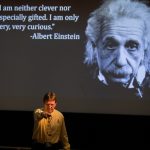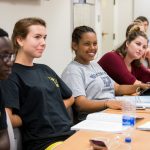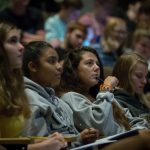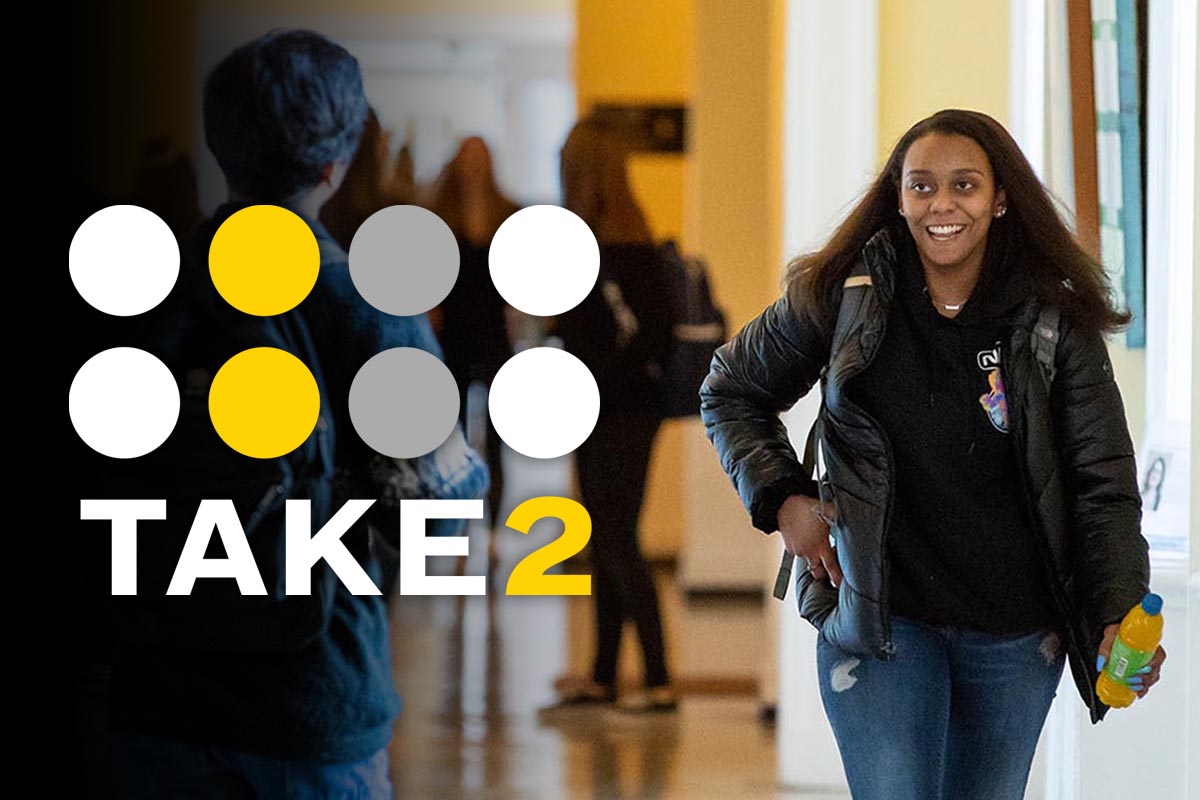Living an Abundant Life: Randolph revamps its first-year common experience course

Philosophy professor Kaija Mortensen interacts with Olivia Chapin ’22 during a classroom discussion about the meaning of Vita abundantior.
Taking her seat in Thoresen Theatre, Maria Nimmo ’22 had low expectations for the lecture that was about to start. It was the first day of classes, and she was there for a required lecture by John d’Entremont, the Theodore H. Jack Professor of History. The topic? How to live a meaningful life.
Forty-five minutes later, Nimmo was anything but bored. She left feeling incredibly inspired, liberated, and excited to begin her college career.
“I thought I was going to hate this class because it’s mandatory and everyone has to do it,” she said. “But that lecture… I was at a loss for words to describe how good it was.”
d’Entremont’s lecture, entitled “Vita Abundantior,” was the opening act for Randolph’s new first-year common academic experience called The Abundant Life. Each week this fall, students have critically explored a potential aspect of what it means to live an abundant life through faculty lectures, readings, group discussions, and other activities. The topics covered in the new program also included honor, love, knowledge, community, and even dying.
In his remarks, d’Entremont described human life as a miracle.
“The thing about miracles is that they must be honored,” d’Entremont said. “The exhilarating opportunities for friendship, knowledge, accomplishment, beauty, fun, love, joy—all of those things are miraculous, and you have them. You have decades ahead of you with those opportunities, and that must be honored. And it must not be dishonored by inattention or complacency or indifference.”
In addition to fostering deep, engaging discussions, the underlying goal of the program is to instill good learning habits in the College’s new students, according to Carl Girelli, vice president for academic affairs and dean of the College.
“There is a hopping exchange among the faculty about how they’re teaching these skills,” Girelli said. “It’s not just about the content they’re teaching. And although it’s valuable content, they’re intentionally addressing how to do close readings of texts, how to do an outline, how to take lecture notes—all kinds of things our students really need to make the transition from perfectly viable high school students to college students.”
There is also a deeper meaning to the lessons being taught, Girelli said.
“Far more than teaching students how to live an abundant life, I think it teaches them how to imagine an abundant life, formulate their own understanding of abundance, and develop the skills and temperament to pursue abundance according to their own understanding of the word,” he added. “And that, in addition to other fine qualities of liberally educated people, is a central part of what it is to be liberally educated. To be free to imagine what, for you, is prosperity and abundance and to be skilled and confident to pursue it.”


 Tags: Carl Girelli, courses, First-year, First-year common experience, John d'Entremont, Vita Fall 2018, Vita No. 5
Tags: Carl Girelli, courses, First-year, First-year common experience, John d'Entremont, Vita Fall 2018, Vita No. 5
